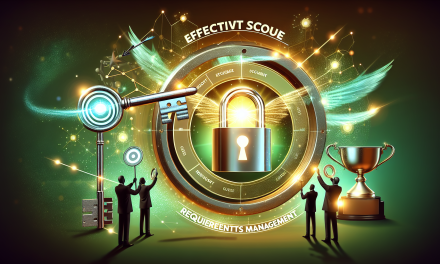Table of Contents
- Introduction
- Importance of Project Leadership Skills
- Key Leadership Skills for Project Managers
- The Role of Effective Communication
- Building and Leading High-Performing Teams
- Engaging Stakeholders Effectively
- Mastering Risk Management
- Planning Projects Successfully
- Conclusion
- Frequently Asked Questions
Introduction
Project leadership is a dynamic and engaging field. It involves guiding teams through complex challenges while achieving project goals. Therefore, developing robust leadership skills becomes essential for anyone embarking on a project management journey. Skills like communication, team management, and stakeholder engagement play a pivotal role in ensuring project success. In the ever-evolving landscape of business, equipping oneself with effective project leadership skills is not just a benefit; it’s a necessity.
Importance of Project Leadership Skills
Understanding the significance of project leadership skills is crucial. These skills empower project managers to navigate the complexities of project execution. First and foremost, when project leaders possess strong leadership qualities, they foster a collaborative environment. Consequently, this cultivates creativity and innovation among team members, which is vital in today’s fast-paced business world.
Furthermore, project leadership skills enhance decision-making capabilities. When leaders are adept at assessing situations, they can make informed decisions swiftly. This agility is often what sets successful projects apart from those that falter due to indecision or poor planning.
Key Leadership Skills for Project Managers
To excel in project leadership, several key skills are indispensable. Let’s explore some of these essential competencies that every project manager should cultivate.
1. Visionary Thinking
A great project leader envisions the future of the project. They see beyond mere tasks and timelines. By understanding the bigger picture, leaders inspire their teams and align everyone towards common objectives.
2. Communication Skills
Effective communication forms the cornerstone of successful project management. Whether it’s sharing updates or addressing concerns, transparent communication ensures everyone remains informed, engaged, and motivated.
3. Problem-Solving Skills
The ability to identify problems and devise effective solutions is imperative. Project leaders face various challenges, and having a proactive mentality helps them navigate through obstacles effectively.
4. Emotional Intelligence
Emotional intelligence allows leaders to understand and manage their emotions and those of their team members. This skill enhances relationships, leading to a more harmonious and productive work environment.
5. Adaptability
Given the constantly changing nature of projects, adaptability becomes a vital skill. Leaders must embrace change and motivate their teams to do the same, ensuring that they can adjust to new circumstances without losing momentum.
The Role of Effective Communication
As mentioned earlier, communication is key. Moreover, it encompasses verbal, non-verbal, and written forms. For instance, imagine a scenario where a project manager fails to communicate changes in project scope. This oversight can lead to confusion and delays. Conversely, regular updates and feedback sessions can significantly enhance team cohesion.
Communication Channels
Choosing the right communication channels is essential. For instance, some teams might thrive on face-to-face interactions, while others may prefer digital platforms. Understanding your team’s preferences allows for more effective dissemination of information.
Encouraging Feedback
Furthermore, creating an open environment for feedback empowers team members. When individuals feel their voices matter, they become more invested in the project outcomes. Thus, fostering a culture of feedback enhances both communication and performance overall.
Building and Leading High-Performing Teams
Building a high-performing team is often the hallmark of a successful project leader. This involves not just assembling a group of skilled individuals but cultivating a cohesive unit that works together toward common objectives.
Selection of Team Members
Remarkably, selecting the right team members is crucial. Instead of merely looking at a candidate’s qualifications, consider how their strengths will complement the existing team dynamics.
Establishing Trust
Trust is the foundation for any effective team. As a leader, establishing trust through transparency and reliability instills confidence and encourages collaboration among team members.
Engaging Stakeholders Effectively
Stakeholders are integral to project success. Hence, engaging them effectively enhances the potential for positive outcomes. This interaction can take many forms, from regular progress updates to soliciting feedback on significant decisions.
Identifying Stakeholders
First, identifying who the stakeholders are is paramount. This includes anyone whose interests may be affected by the project. Additionally, understanding their expectations and objectives fosters a collaborative relationship.
Regular Check-ins
Further, conducting regular check-ins keeps stakeholders informed. This practice not only builds trust but also provides the opportunity to address concerns before they escalate, ensuring smoother project execution.
Mastering Risk Management
Every project carries its share of risks. Understanding these risks and having strategies in place to mitigate them is crucial. Skilled project leaders proactively identify potential threats and develop practical responses.
Risk Assessment Techniques
Implementing risk assessment techniques helps leaders evaluate potential risks. Techniques such as SWOT analysis (Strengths, Weaknesses, Opportunities, Threats) enable project managers to analyze internal and external factors effectively.
Contingency Planning
Equally important is creating contingency plans. These plans outline alternative courses of action should risks materialize. Consequently, having a response plan in place alleviates uncertainty and allows projects to stay on track.
Planning Projects Successfully
Planning serves as the roadmap for any successful project. It outlines the tasks, timelines, and resources needed to achieve objectives. Strong planning capabilities can make the difference between project success and failure.
Utilizing Project Management Tools
Utilizing effective project management tools streamlines the planning process. Various software applications help track progress, manage resources, and facilitate communication among team members.
Regular Reviews of Plans
In addition, regularly reviewing project plans ensures they stay aligned with evolving objectives. Adaptability in planning contributes to better risk management and overall project success.
Conclusion
In conclusion, mastering project leadership skills is integral to achieving project success. From effective communication and team building to stakeholder engagement and risk management, these skills create a solid foundation. Moreover, all these competencies collectively contribute to creating a productive work environment that fosters innovation and collaboration. To further enhance your understanding of these skills, consider exploring resources like the Project Leadership and Management Skills Training Course.
Frequently Asked Questions
What are project leadership skills?
Project leadership skills encompass a set of abilities necessary for effective project management, including communication, problem-solving, delegation, and team building.
Why are leadership skills important in project management?
Leadership skills are crucial as they help project managers guide their teams, engage stakeholders, and overcome challenges, ultimately leading to project success.
How can I improve my project leadership skills?
Improving project leadership skills can be achieved through continuous learning, taking advantage of professional development opportunities, and actively seeking feedback from colleagues and stakeholders.





